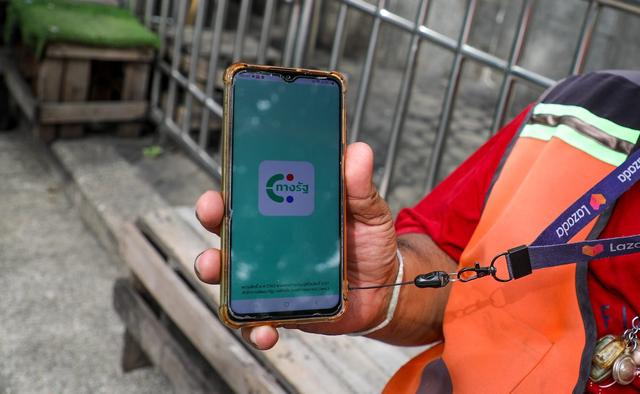
Every year on April 2, the world observes Fact-Checking Day, an international day dedicated to verifying facts. Many organizations in Thailand participate in fact-checking efforts, alongside media outlets and networks worldwide. These include the Thai Online News Producers Association, Cofact and Cofact Community Partners, the Thai Health Promotion Foundation (ThaiHealth), the Faculty of Communication Arts, Chulalongkorn University, AFP Thailand, the National Press Council of Thailand, the Consumer Council, the Safe and Creative Media Development Fund, the Thai Journalists Association, the Foundation for Internet and Civic Culture, and the Friedrich Naumann Foundation for Freedom (FNF) Thailand, as well as the Thai Public Broadcasting Service (Thai PBS). Together, they organized the event “Information War 2025: The Battle for Truth — Reclaiming Information Integrity in the Age”, with a mission to tackle and counter the spread of fake news while strengthening public skills and resilience in verifying the credibility of information. (For more information: https://org.thaipbs.or.th/content/8017 )

Thai PBS presented the topic “Upgrading to Combat Disinformation 4.0”, delivered by Ms. Kanokporn Prasitphon, Director of the Digital Media Department. She stated that Thai PBS Verify is not just a fact-checking platform, but a key mechanism in building information immunity for the public which covers all processes — from collecting, verifying, and analyzing in-depth information to educating citizens on how to recognize and prevent harm. It also helps people learn how to use technological tools, understand key principles, and study real examples of misinformation and fake news in various forms.
Additionally, Thai PBS is fostering collaboration with partner organizations to strengthen the fight against fake news. The platform consolidates knowledge and fact-checking skills through online media channels including the website www.thaipbs.or.th/Verify, and social media platforms such as Facebook, Instagram, TikTok, and LINE @ThaiPBSVerify, allowing audiences to verify news and avoid becoming victims of misinformation in the digital space.

On the occasion of the official launch of Thai PBS Verify, Thai PBS also organized an activity for viewers to share their experiences and awareness of misinformation and fake news, as well as to express their expectations for how Thai PBS Verify can best serve them in the future. The survey was conducted from April 2–20, 2025, with a total of 1,451 respondents.

When asked which topics viewers would like Thai PBS to fact-check, 29% of respondents said they wanted Thai PBS Verify to verify news related to welfare and benefits, as these involve entitlements or programs people should receive from the state or other organizations.
Meanwhile, 25% wanted fact-checking on issues related to health and daily living, as these directly concern safety and the cost of living. Another 20% wanted verification of disaster-related news, as such events often cause loss, fear, and panic in society — for example, the recent earthquake in Thailand that led to widespread confusion and misinformation.
These findings reflect that people continue to seek confidence and well-rounded, reliable information — especially regarding fundamental rights and everyday life matters.

The next topic in the survey explored which platforms viewers use to follow the news. The results showed that 50.3% of respondents get their news from Facebook, accounting for more than half of all participants. This is because Facebook remains the most easily accessible platform, offering a wide variety of content in one place, while the second most popular source was LINE, a communication platform favored by Thai users for its chat and messaging functions. Meanwhile, 11% of respondents still follow news via television, which continues to hold audience interest despite being a traditional medium.
These findings reflect that in today’s digital-first era, Facebook and LINE remain the leading platforms for news consumption. However, there are still viewers who rely on television — which, although not as fast as online media, remains a credible and verifiable source of information.

Regarding the factors that influence audiences to believe certain news stories, the survey found that 73.6% of respondents — a significantly high proportion — said they base their trust on the source of the news. This highlights the importance of maintaining high journalistic standards and credibility within media organizations, as it directly builds public confidence. The second most common factor influencing belief was the platform or channel through which the news is received. Many respondents noted that familiarity, trust, and presentation style on those platforms often lead them to believe the information — sometimes without verifying whether it is true or not.

The final topic from this survey asked about audience behavior — whether they had ever shared or forwarded fake news without realizing it. The results showed that 48.9% were confident that they had never shared fake news before, due to factors such as the source of the news and the platforms they follow. This shows that most people still have knowledge, understanding, and are more cautious.
Meanwhile, 24.9% said they had shared and later found out it was fake news, which may have come from trust, being in a hurry, or not checking before sharing — causing them to share the content without knowing the truth.
Therefore, as a public service broadcaster, Thai PBS plays an important role in combating the widespread dissemination of fake news. In line with its mission to promote media literacy and help audiences develop critical thinking skills, Thai PBS has launched the Thai PBS Verify service — a platform dedicated to fact-checking fake news and filtering accurate information.
This service helps verify and stop the spread of misinformation, while also enhancing public understanding and making it easier for audiences to access the truth (Making truth easy to find). It clearly demonstrates that Thai PBS Verify can effectively serve as a reliable fact-checking tool for the public.
From the survey on audience interest in participating with Thai PBS Verify — where respondents could select more than one option — results from a total of 1,451 participants revealed that:
■ 1% want to receive notifications or alerts about true and false news (1,075 people).
■ 1% want to participate in Thai PBS Verify through events or interactive activities (742 people).
■ 6% are interested in joining workshops or training sessions on fact-checking (516 people).
■ 6% want to submit information for Thai PBS to verify (502 people).
■ 5.2% (76 people) responded “No participation for now” (76 people).
(Note: Participants could select more than one option.)
Highlights from the 2025 International Fact-Checking Day Event





————-
About Thai PBS Verify:
As a public service broadcaster, Thai PBS places great importance on verifying and addressing the widespread circulation of fake news and unchecked information. To help the public develop media literacy and critical thinking skills, Thai PBS has launched Thai PBS Verify — a platform dedicated to fact-checking fake news and filtering accurate information.
This service helps verify and stop the spread of misinformation, while enhancing public understanding and awareness. Audiences can follow news updates, fact-check information, and strengthen their immunity against fake news through the following platform: www.thaipbs.or.th/Verify, Facebook, Instagram, TikTok and LINE @ThaiPBSVerify






